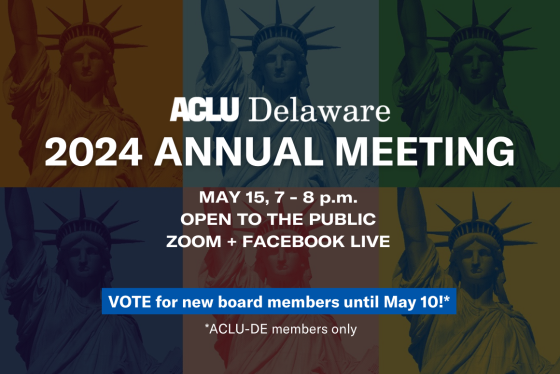CONTACT: Kathleen MacRae, Executive Director— 302-654-5326 x102; kmacrae@aclu-de.org
Wilmington, DE (October 31, 2014) – The American Civil Liberties Union of Delaware this week sent letters to the superintendents of 18 Delaware public school districts requesting that all athletic coaches be reminded that they may not endorse or participate in team prayer. The practice, which was highlighted in a recent News Journal article, violates the Establishment Clause of the First Amendment, which bars actions by school district employees, while acting in their official capacity, that appear to endorse religion.
In his , News Journal high school sports reporter Brad Myers wrote that he has “seen dozens of teams in many sports gathering for prayers. Most of the time, at least one coach is involved.” Team prayer is often viewed as another team building activity or tradition, with coaches—integral members of their team—showing some level of solidarity with their student players. Myers himself related it as “part of the fabric of high school sports.”
However, the Supreme Court has, since 1963, held that public school employees may not, in their capacity as public school employees, act in a manner that appears to endorse religion, regardless of whether or not students initiate and/or lead those activities. The Court of Appeals for this part of the country summarized: “if while acting in their official capacities, [school district] employees join hands in a prayer circle or otherwise manifest approval and solidarity with student religious exercises, they cross the line between respect for religion and endorsement of religion.”
Additionally, telling players that participation is voluntary does not change the legality of coach participation in team prayer. Aside from being figures of authority for their players, coaches are representatives of the State. When the degree of their involvement in or support for team prayer implies that the activity is school-sanctioned, students must choose between exercising their rights to religious freedom and meeting their coaches’ expectations. It asks too much of high school students to expect them to decline to pray if the coach is praying with the team.
As ACLU-DE legal director Richard Morse wrote to district superintendents:
There are two reasons why coaches who participate in or show approval for player prayer at games need to stop. The first is that their actions violate federal and state law. The second is that as school district employees, they should be setting good examples for students. Violating the law in the presence of those students does the opposite.”
